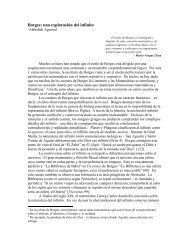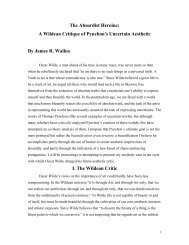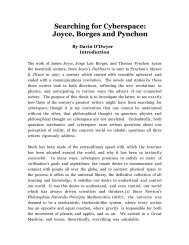And A Very Good Time It Was: A Short Life of ... - The Modern Word
And A Very Good Time It Was: A Short Life of ... - The Modern Word
And A Very Good Time It Was: A Short Life of ... - The Modern Word
Create successful ePaper yourself
Turn your PDF publications into a flip-book with our unique Google optimized e-Paper software.
suppose it never happened; and just as there is no reason to judge Nora because <strong>of</strong> it, there is even<br />
less reason to see the situation through Joyce’s poor eyes and condemn Cosgrave. Peter Costello<br />
puts it best:<br />
This universal denigration <strong>of</strong> Cosgrave is odd, for he emerges in Gogarty’s<br />
memories as a more attractive fellow. <strong>And</strong> indeed what more had he said to<br />
Joyce than the truth? He had gone about with Nora, accompanying her to Joyce’s<br />
concert. He would not have been the first man to make a pass at a friend’s new<br />
floozy.... As we have only Joyce’s version <strong>of</strong> this history, we can allow Vincent<br />
Cosgrave a generous thought or two. 106<br />
Joyce and Giorgio also went to Galway to visit Nora’s mother, and before returning to Trieste<br />
he signed a contract with Mansel & Co., who agreed to publish Dubliners. But he was in Trieste<br />
barely a month before he returned to Ireland in October. A chance remark that Dublin, unlike<br />
Trieste—a major film distribution center—had no cinemas, lit Joyce with a sure-fire scheme to<br />
make some real money. He approached a group <strong>of</strong> investors, saying, “I know a city <strong>of</strong> 500,000<br />
inhabitants where there is not a single cinema.” 107 He <strong>of</strong>fered to be the agent in Dublin—all he<br />
needed was the money. <strong>The</strong>y agreed, and after finding and renovating the site and hiring the staff,<br />
Joyce left the management <strong>of</strong> the Volta <strong>The</strong>atre to one <strong>of</strong> the investors and returned to Trieste in<br />
December.<br />
While still in Dublin his letters to Nora, first in the expected accusatory, jealous, pious and<br />
worshipful tone, finally became astonishingly explicit. Even his dirty letters, “an extreme <strong>of</strong><br />
Joyce’s, and perhaps <strong>of</strong> human, utterance,” 108 bear his unmistakable stamp. But, as extreme as the<br />
letters are, there is no use in either <strong>of</strong> making too much out <strong>of</strong> them or being too respectable<br />
(really just squeamish) to say much about them at all. Peter Costello is right that the letters<br />
“distort what he know about Joyce,” 109 but only if we focus on the letters more than we should. To<br />
say, as Edna O’Brien does, that “they are as outright in their earthiness as the mystics are in their<br />
ecstasies, yet they share the mystics longing for a couple to dissolve into one” 110 is a bit silly. H.<br />
G. Wells, writing to Joyce many years later, said it was Joyce’s Catholic upbringing that focused<br />
his mind on dirty words, and these remarks say more about the true natures <strong>of</strong> the letters—far<br />
from erotic and more adolescent:<br />
You really believe in chastity, purity, and the person God and that is why you are<br />
always breaking out into cries <strong>of</strong> cunt, shit and hell. As I don’t believe in these<br />
things except as quite provisional values my mind has never been shocked to<br />
outcries by the existence <strong>of</strong> water closets and menstrual bandages.... 111<br />
Nora’s side <strong>of</strong> the correspondence do not survive, the fact that any <strong>of</strong> this was put to paper<br />
shows, if anything, the immense amount <strong>of</strong> trust there was between the two.<br />
Soon after accepting Dubliners for publication, it was apparent George Roberts, the director<br />
at Manusel, was having the same fears as Grant Richards before him. Now objections were raised<br />
to Joyce’s favorite <strong>of</strong> the stories, “Ivy Day in the Committee Room,” where, amid perceived<br />
insults on Edward VII, the Queen Mother is referred to as a “bloody old bitch.” Joyce rightly (as<br />
usual) pointed out that Richards hadn’t objected to these passages when Edward VII had been<br />
alive; now that he was dead, there was even slimmer chance <strong>of</strong> <strong>of</strong>fending him. Joyce <strong>of</strong>fered a<br />
concession, Roberts refused, and publication was again delayed.<br />
In July, he sent a detailed history <strong>of</strong> all the troubles he’d had with the book to various Dublin<br />
newspapers. He hoped that by publishing his letter as well as the supposedly <strong>of</strong>fensive passages<br />
(as the Sinn Féin did) he would prove that they weren’t obscene at all. Roberts’ only response<br />
was, in part, “I don’t think you quite realise a publisher’s difficulties.” 112<br />
Now Nora decided to visit Ireland, and Joyce asked her to talk to Roberts on behalf <strong>of</strong><br />
Dubliners. Once she arrived Joyce flooded her with angry letters for not writing to him





